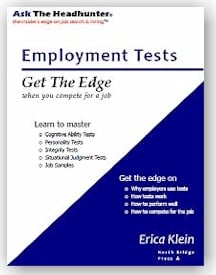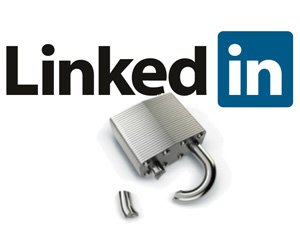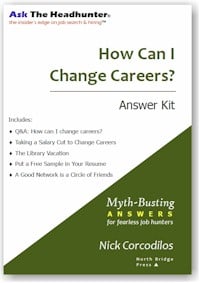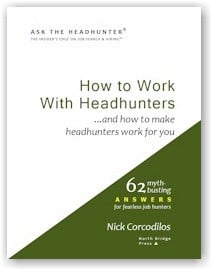When I answer readers’ questions, we don’t usually learn about the outcome. In this week’s edition, a reader follows up and we see what happens when someone takes my advice.
In the August 19, 2014 Ask The Headhunter Newsletter, a job seeker interviews an employer before the interview:
 I have been invited to interview for a management job at a small firm. I researched the company and reviewed the job description and requirements, which are vague at best but, in general, I meet all the criteria.
I have been invited to interview for a management job at a small firm. I researched the company and reviewed the job description and requirements, which are vague at best but, in general, I meet all the criteria.
After agreeing on a date and time for the face-to-face interview (set by the HR specialist), I inquired about the possibility of a phone screen with the hiring manager so I can get all the larger particulars out of the way and then determine if there is any synergy between the company and my own employment interests. I was informed that the company prefers to do all screening in person.
I take interviewing seriously, but I have a good job now and I have very specific career goals. Also, I try not to waste time away from work unless I am certain the job interview will have a high likelihood in piquing my interest. So, with a few days to go, I sent an e-mail asking for the basic information in written form. This is how I phrased it:
Hello,
May I impose on you for a few details about this position that I will be interviewing for soon?
- Is this a hybrid managerial/hands-on position? Can you guess-timate the percentage of hands-on to managerial time?
- Is there a large amount of travel associated with this position?
- Can you give a salary range?
- Will this position have an annual training budget to keep up the skill-set needed to grow with the company?
Thanks very much!
I received no reply for three days. When I politely inquired again, I was told, “My apologies for the late response. Our management team will be able to answer all of these questions in the interview tomorrow.”
My instinct is telling me to cancel this interview. If the company cannot provide basic information to a prospective candidate, why should I spend three hours of my time? It’s a crap shoot at best, and a waste of time at worst. The interview is tomorrow afternoon. How would you handle this?
Nick’s Reply
Thanks for sharing a good example of when it’s good to turn down a job interview — even in today’s economy.
The questions you’re asking are all reasonable. In fact, they’re important to help you decide whether to go to the in-person interview. I wish everyone did what you’re doing. It’s smart and it’s professional.
I agree with your instincts, especially if you’re under no pressure to get a new job. But here’s what I’d do. I’d call the hiring manager if you can, and otherwise the person who has been e-mailing you from the company. (If e-mail is your only choice, fine, but I’d really try to talk with the person.)
Just as politely as you’ve already handled it, I’d explain that your work schedule is very busy, so you do your best to confirm whether a job is right for you before you attend interviews. Say you’d like to interview for the job — if they can first provide you with answers to the basic questions you’ve asked. Do your best to have this discussion with the actual hiring manager.
If the person you speak with will not answer your questions, or insists that you show up for a meeting, I’d politely explain that, unfortunately, in the absence of this basic information which you need to make a reasonable judgment, you’ll have to respectfully decline the interview. I know someone will chide me for telling a job seeker to walk away from an opportunity, but not all interviews are worth attending — they’re not opportunities. What’s shocking is how employers waste so much time and resources on ill-advised interviews. (See Half-Assed Recruiting: Why employers can’t find talent.)
I admire your integrity and your sense of doing good business. If you don’t get the information you need, I wouldn’t go to the interview. Every job seeker needs to draw a line somewhere. (Here’s another line: Pursue Companies, Not Jobs.) Just bear in mind that the company may put a big X on your file and never consider you again. On the other hand, you may not want to reconsider them any time soon yourself.
I’d love to know what you decide to do, and the outcome. It would be a shame to miss a good opportunity over something like this – but this is a data point that more people should think about more carefully.
Employers are crying there’s a talent shortage and that they can’t make good hires. Then they behave like rule-bound fools when a candidate they want to meet demonstrates the kind of intelligence they’d like to hire. Go figure. You’re trying to save them time by demonstrating good judgment and good business practices. As a buddy of mine likes to say, people who behave like this make it easier for those of us that “get it” to succeed – because there’s less competition.
The reader responds
Nick, thanks very much for your reply! I managed to find the e-mail address of the director of the department that has the open job. I sent this e-mail:
Hi <name withheld>,
I hope this e-mail isn’t too intrusive. I have been invited to interview in person for a manager position later today. I’m contacting you because HR has declined to provide me with some basic information about this position. (I asked about travel requirements, salary range, hands-on vs. managerial, education budget.)
If you know the hiring manager (or maybe you are the hiring manager), would you please pass my number and e-mail on to that person and ask them to contact me? I am hoping to get some basic questions answered before committing time out of my work schedule to attend an interview. I have specific career goals and usually like to have a brief ten-minute conversation with the hiring manager before the actual interview. In my experience, this strategy saves time for everyone involved in the process.
I appreciate any effort you can make in this area and look forward to possibly meeting you. Thanks…
After a few minutes, I received a response:
Thank you for your e0mail.
We use our interview process to ask and answer questions. We have not been in the position before that an applicant requested to have questions answered prior to the interview. Frankly, given the size of our company and resources, we do not have a good avenue to address these types of requests, as multiple team members would be able to address different types of questions in the interview. I understand your position, and agree that it does not make sense to waste the time of either party. If you prefer to not go forward with the interview, please let me know and I can take you off of the schedule.
It sounds like they aren’t using logic at this point. She states that they “have not been in the position before…” where an applicant asks questions before showing up, which I find unbelievable. Is there really no “good avenue to address these type of requests?” Seriously, are my questions that difficult? Am I the only one that finds this puzzling? Anyway, I will decline the interview at this point. Again, your advice and column are extremely helpful and appreciated!
Nick’s Reply
In the time it took to write all that, the director could have answered your questions. Or, perhaps the director didn’t have the answers. That’s another problem altogether. I do admire the fact that you were given the choice about whether to proceed — they didn’t reject you for pressing them.
Nonetheless, I smell a management problem. Too bad. Here’s what bugs me the most:
“We do not have a good avenue to address these types of requests, as multiple team members would be able to address different types of questions in the interview.”
Your questions are all simple, factual ones that the director should be able to answer easily in advance. I think you’re doing the right thing.
The cost of interviewing job applicants is significant for employers and, as you’ve pointed out, you incur a cost, too. Too often, job seekers think any interview itself is the big payday, and they are loathe to pass it up, even when it’s irrational to go. Your questions were all legitimate make-or-break issues that a company can easily respond to in e-mail or on the phone. If applicants asked more questions before interviewing, and if employers were more candid, then fewer interviews would be a waste of time.
All I can say is, keep on truckin’. The point is to meet a company that’s a match, not to talk to every company that comes along. Again, I admire your integrity.
Think twice
I’d like to make one comment to job seekers who might think you (the reader in today’s Q&A) can “afford” to turn down this interview because you’re secure in your job — while they may not have that “luxury” because they’re unemployed. Every interview requires an investment of time, energy, planning, and — yes — gas money. The point isn’t to get more interviews; it’s to get interviews where the job meets your objectives, whatever they are. There are multiple downside costs to every wrong interview because it takes you farther from truly good opportunities. Pick your jobs carefully before you pick your interviews — and that requires thinking twice when an employer can’t give you good answers before you buy more gas.
Additional Resources
If you want to check out employers more thoroughly, see “How to pick worthy companies” (pp. 10-12), “Is this a Mickey Mouse operation?” (pp. 13-15) and “Scuttlebutt: Get the truth about private companies” (pp. 22-24) in Fearless Job Hunting, Book 5: Get The Right Employer’s Full Attention.
To dig even deeper before you take an interview, in Fearless Job Hunting, Book 8: Play Hardball With Employers, you’ll find “Avoid Disaster: Check out the employer” (pp. 11-12) and “Due Diligence: Don’t take a job without it” (pp. 23-25).
What makes you reject an interview invitation? Or, nowadays, is it just best to take any interview you can get? What do you think the reader in this week’s Q&A should have done?
: :
 Here’s the blasphemy: You write your resume only after you’ve talked to the hiring manager. It’s not your “marketing piece” and it doesn’t “introduce you.” You introduce you.
Here’s the blasphemy: You write your resume only after you’ve talked to the hiring manager. It’s not your “marketing piece” and it doesn’t “introduce you.” You introduce you.





 I just read your expose on CareerBuilder (
I just read your expose on CareerBuilder ( Networking is not about using people. It’s about hanging out with the people you want to work with, where they hang out — talking shop, contributing to your professional community and making friends. The
Networking is not about using people. It’s about hanging out with the people you want to work with, where they hang out — talking shop, contributing to your professional community and making friends. The 